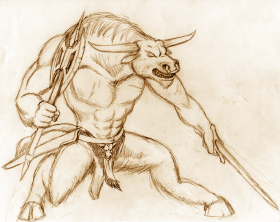Gladiators
Gladiators are warriors who fight to the death for the amusement of an audience. While the gladiator games sometimes serve merely as a method of execution for prisoners of war, there is a long and deadly tournament held every year in the Achaean Empire, and sometimes outside of its borders, in which gladiator schools who win enough fights in a series may compete for the title of Grand Champion.
Community leaders both in Achaea and elsewhere use these games a way to distract the citizenry and win their favor. Larger games can also attract great crowds of tourists to the city, generating income.
Gladiator fights are usually to the death. If a gladiator has an enemy at his mercy, he may let him live of his own volition, or beckon to the crowd or a particularly important spectator, such as a king, for their judgment. Thumbs up means life, thumbs down means death.
Pit Fights
A gladiator fight that is not part of the Imperial tournament is sometimes referred to as a pit fight. These are usually held simply to distract and entertain the masses, and sometimes to train gladiators. A few are simply for sport, pitting a gladiator or team of gladiators against a beast or monster that they are sure to defeat, satisfying the people's lust for blood while honing their skills for the real games. Others are more serious affairs, in which a convicted criminal is executed by being forced into a fight he has no hope of winning. This can occasionally be a risky form of execution, however, for if the criminal should defeat his foe by some miracle, Imperial law states that he must then be allowed to live out his days as a gladiator in the games.
Gladiator Schools
Some men make a career out of the arena, training schools of gladiators in the hopes of winning prize money. Winners of important fights are awarded a hefty winner's purse. Whether or not the actual fighters see any of this money depends on who is running the individual school. Some are operated by wealthy noblemen who buy and sell slave fighters, others by old warriors looking for a new kind of glory. Masters of gladiator schools buy, sell, and trade fighters in an attempt to build the best possible team.
Gladiators come from many different walks of life, and fight for many different reasons. Usually, they are one of the following:
- Slaves. These might be prisoners of war, convicted criminals, or merely slave fighters purchased from elsewhere. They fight for food and the hope that they might someday win or buy their freedom. Some masters pay their slave fighters, others do not.
- Volunteers. Sometimes a skilled fighter will join a gladiator school voluntarily, or be hired to do so as a mercenary, seeking gold and/or glory. These men always either very brave or very desperate. Or mad. Some emperors have even fought in the arena, to the glee of the masses.
- Monsters. Many gladiator schools will jump at the chance to buy or capture a monster to use as a fighter in the arena. If the monster is humanoid and intelligent enough to speak, it may be considered a fighter in the school, but since it is a monster, it may never earn its freedom. These are usually beastfolk or one of the chaos races.
The Imperial Tournament
Gladiator schools spend most of their time traveling from town to town and performing minor fights for the amusement of the masses, earning a little money for their troubles. But there is also a series of games organized by the Imperial government with far greater prizes. Schools who sign up for this tournament face each other in a bracket system until only one remains.
There are essentially ___ tiers of games:
- Pit Fights. Explained above.
- Lesser Games. Held in small arenas or even makeshift pits, these are where the newer schools test their mettle and are often torn to bits. Prizes are small, as is the glory.
- Imperial Games. Those schools that earn a place on the roster fight in larger arenas for great crowds of spectators, winning valuable prizes. Most battles in the Imperial tournament fall into this tier.
- Royal Games. A special situation. If a king or queen (or other important official, such as a paladin) oversees a fight, they may grant a request to the winner. In effect, the mere presence of royalty makes the stakes far higher, for a prisoner or slave may ask for his freedom. Should the request be granted (and they usually are, lest the requestee lose face), then the gladiator school could lose an able fighter.
- Grand Championship. The final games of the tournament, usually overseen by the Emperor himself in the great arena at Caltha. All members of the winning team are granted a request by the Emperor, and the school wins an enormous amount of prize money. The best gladiator in the school will then go on to face the Grand Champion himself in single combat for that most valued of titles. There can be only one Grand Champion. For over ten years, the reigning Grand Champion has been a minotaur named Langstrom, who remains undefeated.
The Imperial tournament is an old tradition, but not as old as the Olympian Games, which are far more peaceful, and are considered a nobler, more intellectual competition. Many northern kingdoms ignore both of these in favor of jousting tournaments between nobles. They are most popular in the old Achaean heartland.
